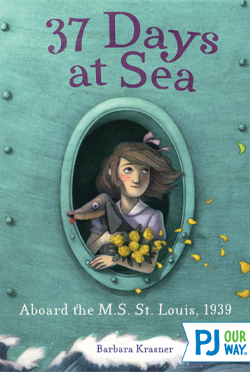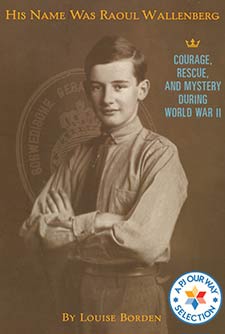37 Days at Sea: Aboard the M.S. St. Louis 1939
Ruthie and her family are fleeing the Nazis on a luxury cruise ship. She and her friend Wolfie are having a blast, dressing up for dinner and playing pranks on the other passengers. But the adventure turns into a nightmare as one country after another refuses entry to the Jewish refugees. Will Ruthie and her family ever get off the ship?
Average Rating
( hint: Login to leave a review! )
76 Reviews
Leave Review
What the Book Is About
Jewish Content & Values
Positive Role Models
Content Advisory
Talk It Over
What the Book Is About
Twelve-year-old Ruthie and her family flee Nazi Germany on a ship bound for America via Cuba. In this novel in verse, Ruthie tells of her antics with her new friend Wolfie and the kind captain who tries to make the refugees feel at home – but also the Nazi crewman and the growing fear that no country will accept the refugees and the ship will be forced to return to Europe. Although Ruthie and her family do reach safety, an afterword gives more information, told in an age-appropriate way, about the fate of the M.S. St. Louis and many of its passengers.
Jewish Content & Values
- The story’s focus is the attempt by the Jewish passengers of the M.S. St. Louis to find refuge in the United States after fleeing Nazi Germany.
- On board the ship, the passengers hold separate Shabbat services for Orthodox, Conservative and Reform passengers, and the ship’s kitchen provides dairy meals on Shavuot.
- When Ruthie’s father suddenly falls ill, she prays to God that he will recover.
Positive Role Models
- Despite the fear and uncertainty faced by the passengers, Ruthie tries her best to engage the other passengers in positive activities to keep their spirits up.
- Captain Schroeder, who in real life never joined the Nazi party and was named Righteous Among the Nations by Yad Vashem, is kind to the Jewish passengers on the ship. He also fires the crew member who is a Nazi sympathizer. When forced to return to Europe, he hatches a plan to sail to England and send the passengers ashore on lifeboats.
Content Advisory
Ruthie sees people with shaved heads on the ship, and her father explains that they were in concentration camps. When the Cubans won’t let the ship dock, Ruthie’s mother says that they’re all doomed. A refugee who had been in a concentration camp says if they go back to Europe, “It’s the camps for all of us,” and Ruthie’s father explains in general, age-appropriate terms about concentration camps. The afterword explains that when the United States refused to accept the refugees, the ship returned to Europe and a third of the passengers died in the Holocaust.
Talk It Over
When the passengers are afraid that they will have to go back to Nazi Germany, Ruthie decides to cheer everyone up by taking a funny book out of the library and encouraging the other passengers to draw comics and make up stories. Have you ever had to cheer up someone who was worried or sad? If so, what did you do? If not, what do you think you would do?
What the Book Is About
What the Book Is About
Twelve-year-old Ruthie and her family flee Nazi Germany on a ship bound for America via Cuba. In this novel in verse, Ruthie tells of her antics with her new friend Wolfie and the kind captain who tries to make the refugees feel at home – but also the Nazi crewman and the growing fear that no country will accept the refugees and the ship will be forced to return to Europe. Although Ruthie and her family do reach safety, an afterword gives more information, told in an age-appropriate way, about the fate of the M.S. St. Louis and many of its passengers.
Jewish Content & Values
Jewish Content & Values
- The story’s focus is the attempt by the Jewish passengers of the M.S. St. Louis to find refuge in the United States after fleeing Nazi Germany.
- On board the ship, the passengers hold separate Shabbat services for Orthodox, Conservative and Reform passengers, and the ship’s kitchen provides dairy meals on Shavuot.
- When Ruthie’s father suddenly falls ill, she prays to God that he will recover.
Positive Role Models
Positive Role Models
- Despite the fear and uncertainty faced by the passengers, Ruthie tries her best to engage the other passengers in positive activities to keep their spirits up.
- Captain Schroeder, who in real life never joined the Nazi party and was named Righteous Among the Nations by Yad Vashem, is kind to the Jewish passengers on the ship. He also fires the crew member who is a Nazi sympathizer. When forced to return to Europe, he hatches a plan to sail to England and send the passengers ashore on lifeboats.
Content Advisory
Content Advisory
Ruthie sees people with shaved heads on the ship, and her father explains that they were in concentration camps. When the Cubans won’t let the ship dock, Ruthie’s mother says that they’re all doomed. A refugee who had been in a concentration camp says if they go back to Europe, “It’s the camps for all of us,” and Ruthie’s father explains in general, age-appropriate terms about concentration camps. The afterword explains that when the United States refused to accept the refugees, the ship returned to Europe and a third of the passengers died in the Holocaust.
Talk It Over
Talk It Over
When the passengers are afraid that they will have to go back to Nazi Germany, Ruthie decides to cheer everyone up by taking a funny book out of the library and encouraging the other passengers to draw comics and make up stories. Have you ever had to cheer up someone who was worried or sad? If so, what did you do? If not, what do you think you would do?




